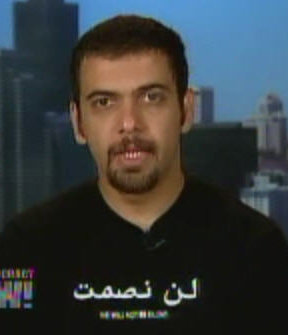En tredje vej?

Irakeren Raed Jarrar (som er den Raed, Baghdad-bloggeren Salam Pax opkaldte sin blog efter) ser ikke meget valg eller i hvert fald ikke mange valgmuligheder i det Store Amerikanske Præsidentvalg.
Som jeg selv har været inde på, kan det være svært at se andet end overfladisk forskel på kandidaterne: "Someone like me who was in Baghdad while the first Bush, then Clinton, then the second Bush dropped bombs on our neighborhoods realises that there is not a "dime's worth of difference" between the two ruling parties and their one foreign policy".
Jarrar forklarer videre:
When I first immigrated to the US in 2005, I was interested in foreign policy issues and spent most of my time working to end the occupation of Iraq and stop the blind support and unlimited aid to Israel.Link (hvis De vil vide mere).
Then I had a life-changing incident in 2006, when I was stopped at an airport in New York and prevented from boarding to my airplane because my T-shirt had the words "we will not be silent" in both Arabic and English printed on it.
A TSA [transportation security officer] told me that coming to a US airport with Arabic words on my T-shirt was equivalent to visiting a bank while wearing a shirt that read "I'm a robber".
After making me cover my shirt, the officers changed my seat from the front to the back of the airplane.
A new fight
This incident opened my eyes and led me to learn more about the long history of racial discrimination and about the shrinking space for individual freedom in the US.
I came to realise that the same government that had bombed my neighbourhood and destroyed my freedom in Baghdad was now attacking my freedom in New York City.
It was now my personal responsibility to fight, both for my constitutional rights and to end the illegal US intervention in Iraq.
While I cannot vote - because I am not a US citizen - I can still support the candidates financially and volunteer to help their campaigns.
Therefore, I searched carefully for a presidential candidate who would bring all troops out of Iraq, end the US intervention in the Middle East and the rest of the world and restore individual rights to protect me and everyone else who lives in the US.
An 'open' system?
The first thing that drew my attention while following the primaries was the number of interviews with supposedly "ordinary" citizens who were running to win the nomination for one of the two ruling parties.
Interviews with the candidates were used by the mainstream media as a joke and invested by the establishment to maintain the "open political system" image.
But studying the record of the US elections' system suggests a different picture.
While polls indicate that around 80 per cent of the US population disapproves of the work of the federal congress, more than nine out of 10 DC officials get re-elected every general election.
In 2006, 94 per cent of house incumbents also won re-election and in 2004 they had a better than 99 per cent success rate.
Debating the debates
I learned a lot of other new things about the US political system during the last two years and, the more I learn about this system, the more I realised how closed and exclusive it is.
For example, millions of US tax payers - including myself - spend long hours watching the presidential candidates' debates.
We then watch yet more hours of media pundits debating the debates, then spend even more hours with friends and colleagues debating the media debates on the debates!
But not everyone knows that the US presidential debates are administrated by a corporation called the Commission on Presidential Candidates, which is led by former leaders from the two ruling parties.
And they make sure no third party candidates can ever be admitted to use their megaphone.
